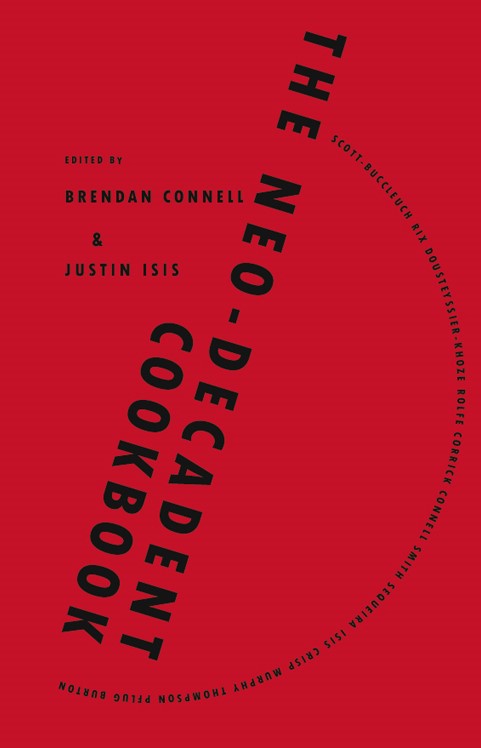Edited By BRENDAN CONNELL, JUSTIN ISIS (Eibonvale; 2020)
The neo-decadent movement is well represented by this anthology, which purports to be a cookbook. n actuality only the second-to-last offering, “Nettle Tea” by Ursula Pfiug, which provides more-or-less straightforward instructions on how to concoct that delicacy, conforms to the strictures of a true cooking manual. The rest of the book stands as a potent sampling of neo-decadent preoccupations, with a focus on foodstuffs both real and imaginary; as the back cover inquires, “Have you ever sautéed geometrical sex or eaten fate from the breasts of Minerva?”
The editors Brendan Connell and Justin Isis are authors whose respective outputs make them ideal curators for this anthology, and neo-decadence in general. It’s a movement that, according to Connell, seeks to “honor the fragmented, the contorted, the unfinished, the unpublished…translated from the language of lizards and snakes, plagiarized from deep wells and signed with hands wet with the dew of rotting fruit.” Isis, for his part, explains it this way: “Neo-Decadence is…likely to cross 1990s video game dialogue with the structure of a 16th century picaresque to discuss a drug deal in present day Mongolia.”
That aesthetic is evident in the opening manifesto, in which the editors promise to “PURGE OURSELVES OF MERE PHYSICAL HUNGER AND DINE IN THE LAPS OF THE IMPOVERISHED GODS,” and the proceeding contents. Unfiltered surrealism is a constant (it’s not for nothing that a pivotal character in one story is named Nadja), as is a type of poetic dissonance that may be unique to the Neo-Decadents (“Usurp the tongue as arbiter of choice:/overrule distaste and/IGNORE the bias of affinity”).
The three part “London in Three Courses” by Eibonvale’s head David Rix involves a boat named (appropriately enough) the Eibonvale, Horse Leeches (apparently a “nice chewy morsel” that is “simply known as Leech Loaf when minced and formed into the right shape”) and elephants. “The Wild Hunt” by Eibonvale regular Douglas Thompson asks “What is the recipe for woman and for man?,” and answers thusly: “A pinch of dirt, of mandrake, the semen of hanged men, the crushed shells of some beetles, a dozen lizards’ tails.”
There are attempts at actual narratives with a beginning, middle and end, such as “Koliva” by Daniel Corrick, about an urbane gentleman with a taste for Koliva (a dish usually served at funerals), but of course there’s a lot more to this deceptively simple tale than that. Quentin S. Crisp offers a dissertation on fruit, to which he claims to have a “longstanding aversion.” Apples, he finds, are the “first innuendo,” while he dismisses bananas by recalling a passage from THE NAKED CIVIL SERVANT, written by the other Quentin Crisp, while grapes are permissible only “when they have been thoroughly crushed and transformed into wine.” The editors also contribute, with Connell’s “Household Hints” advising us on the joys of color-coded meals and Isis’s “Machines That Eat Flowers” providing a haunting evocation of otherworldly isolation on a secluded island that recalls Jules Supervielle’s immortal “L’Enfant de la haute mer” (“The Child of the High Seas”).
I think you get the drift: in the category of Neo-Decadence this book makes for an excellent primer that’s also ideal for anyone interested in wild and plain nutty fiction. Plus the book is quite short, running a fast 168 pages that can be easily devoured in an hour or two. To quote the late Thomas M. Disch, it’s an (all-too-rare) example of postmodernism without pain.

